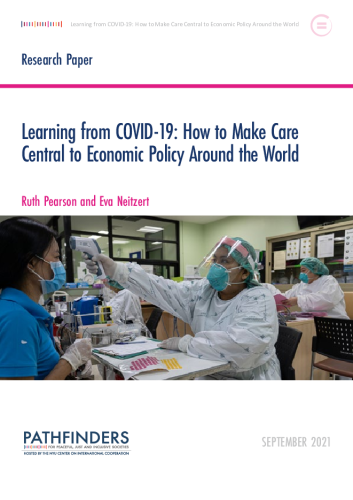Learning from COVID-19: How to Make Care Central to Economic Policy Around the World

After decades of neglect, the COVID-19 pandemic has made visible the vital role that the care economy plays in the functioning of economies and societies—and highlighted the deep crisis at the heart of it.
Care recipients and providers of care have been on the COVID-19 frontlines, and the ability of governments to mount an effective response to the pandemic has been hampered by decades of policies that undervalued and neglected the care economy. Several factors have combined to create this perfect storm.
Globally, care needs have been on the rise for some time, and funding has failed to keep up. In many contexts, market-driven approaches have resulted in fragmented sectors, particularly around social and elder care, seeking to drive down labor costs. The result is high levels of unmet need and poor working conditions for the largely feminized workforce.
Beyond the paid care sector, and partly because of its inadequate reach, women continue to bear the disproportionate burden of unpaid care, carrying out 76% of all unpaid care work. This reduces opportunities for paid employment, further exacerbating gender inequalities, and is a trend that has only intensified in the course of the pandemic.
Thriving economies and societies depend on care in all its forms. It is imperative that economies and societies rebuild better, with care at the centre of their recovery plans. Prioritizing the care economy will pay dividends not only for those in need of care and those that provide care, but also help to build stronger economies and more equal societies. Investment in the social infrastructure has been demonstrated, time and again, to deliver employment and fiscal benefits as well as to promote gender equality and social inclusion. It is also consistent with the need to reduce our carbon footprint and move to greener economic models.
This paper sets out six key steps for building sustainable and thriving care economies:
- Make visible unpaid work in headline economic indicators to ensure that caring work recieves due recognition and comes to the attention of social and economic policymakers.
- Redefine spending on care as “investment” rather than “expenditure,” in recognition of the long-term dividends that investment in care yields, including its employment and fiscal benefits.
- Develop ongoing, sustainable funding to invest in care, including from novel financial instruments, to ensure that provision is adequate to meet needs.
- Recognize the value of unpaid care work and encourage a more equal gender distribution in order to reduce the burden on women and promote gender equality.
- Transform paid care work to provide decent pay, conditions, and standards in recognition of the value that caring provides to all of us.
- Reframe the care debate to put care at the heart of the economy and society in order to build a political consensus to support the care economy.
With our dependence on the caring economy more visible than ever, there is considerable public support for such measures. This has created a unique political opportunity to fix the care crisis and leave a positive legacy for future generations.